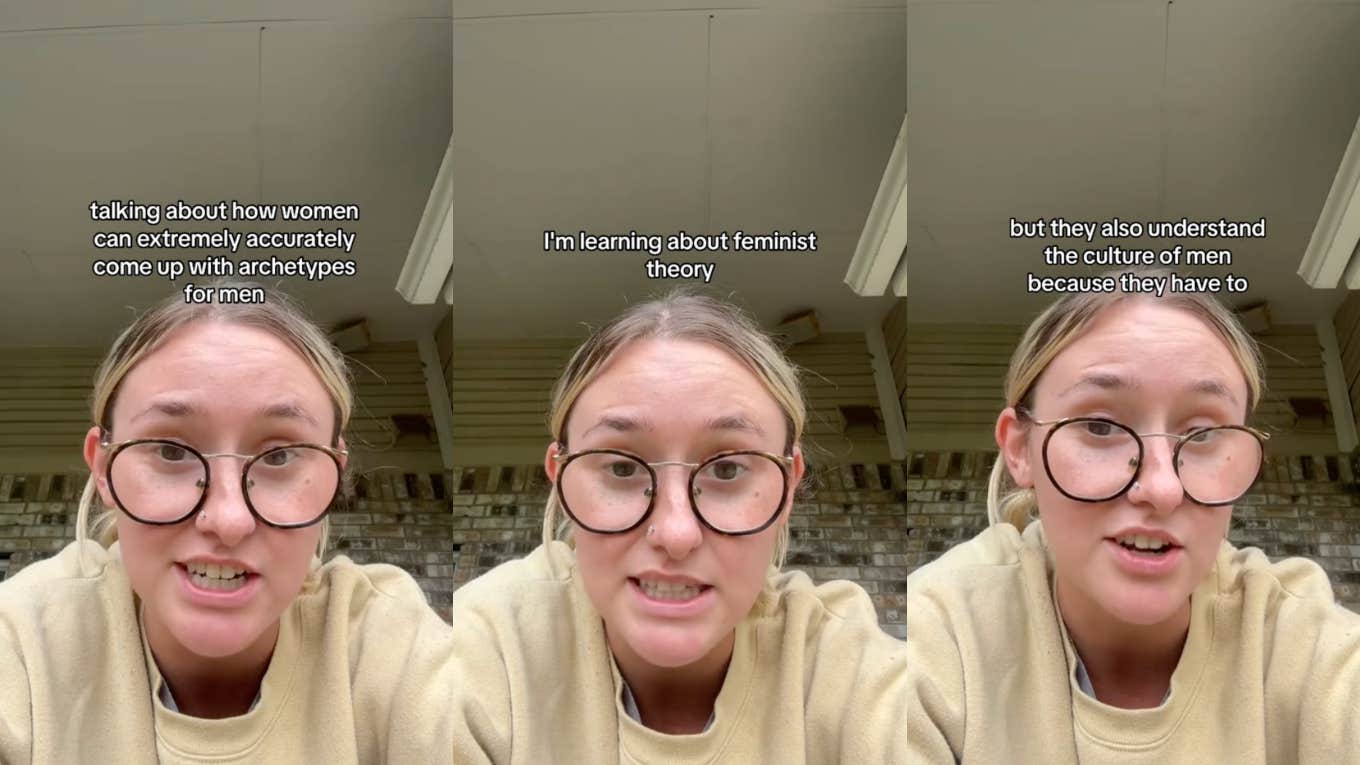The Psychological Reason Women Understand Men But Men Don’t Understand Women
A psychology student breaks it down.
 @izziebobizziewizzie / TikTok
@izziebobizziewizzie / TikTok In a world filled with complex human relationships and connections, the dynamic between men and women is often shrouded in mystery. It seems women can fully grasp and comprehend certain aspects of the male experience, while men struggle immensely to understand women.
This concept was explored by a psychology student named Izzie, who shared in a TikTok video what she's learned about the relationship women and men have with each other in a patriarchal society.
She explained that women can understand male culture because it's vital to our survival.
Izzie's conversation was first sparked by another video of a woman joking about a man looking angry when his children are fed dinner before he is.
"I've seen discourse around these videos talking about how women can accurately come up with archetypes for men," Izzie began in her video, pointing out that rarely are men able to understand the female experience and struggle with being able to accurately depict archetypes for us.
This acknowledgment is valid, especially when looking at the number of films, books, and other media made by men that either inaccurately depict women's culture, or exaggerate women's characters to the point of being wildly offensive or harmful. This is usually referred to as the male gaze and is prevalent in an exorbitant amount of popular media.
Izzie explained that in her psychology class, she's learning about feminist theory, and one aspect completely blew her mind as it explained the exact reason why women find it easier to comprehend men in a much better way than men can for us.
"Women are considered bicultural, like most marginalized groups, in not only do they understand the culture they are physically part of but they also understand (deeply) the culture of the dominant group in order to survive within that majority culture," Izzie said. "Women not only understand the culture of fellow women but they also understand the culture of men because they have to, whereas men do not understand female culture because they don't have to."
Izzie's assessment is truly fascinating, especially upon realizing that in a patriarchal society, many of the power dynamics favor men, whereas as women, we find ourselves navigating a cultural landscape that is not only heavily influenced by our own culture but influenced by a male-dominated one as well. This dual cultural awareness manifests in the everyday lives of women, from social interactions to workplace dynamics, and even heterosexual relationships.
Women are constantly having to code-switch between these two cultures, and it's not a luxury but rather a means to survive.
This theory doesn't just apply to women, but others in marginalized communities.
Izzie's assessment of this dual cultural society that women live in can also be heavily applied to people in other marginalized communities, especially Black women. For the last four hundred years, Black women have been navigating the spaces of white women, white men, and Black men, and adapting the same code-switch method as a means of our own survival.
Black women experience intersectionality, navigating both gender and racial dynamics simultaneously. Civil rights activist W.E.B. Du Bois coined the concept of "double consciousness" which becomes relevant here, where Black women are constantly aware of how they are perceived both as women and as Black individuals.
Just as men often view women through the "male gaze" and harmful media representation, the same can be said for Black women. We often face these outdated and racist stereotypes that intersect both race and gender. Through these harmful tropes, Black women have to challenge these stereotypes while also conforming to societal expectations just to be taken seriously.
It doesn't take much to look at this and realize something needs to change. It all goes back to the activist work that is expected from white people, and of course, men. Black women didn't build this system, and shouldn't be responsible for having to conform just to survive. There's no excuse anymore for this disconnect between both men and women, as Izzie pointed out, and Black women with everyone else.
Izzie's exploration into the themes being talked about in her psychology class invites both reflection and action. Understanding is but the bare minimum as it doesn't mean anything unless there is a purpose behind it.
Nia Tipton is a Chicago-based entertainment, news, and lifestyle writer whose work delves into modern-day issues and experiences.

